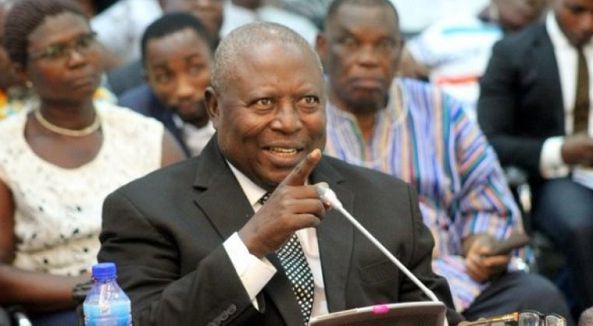
Martin Amidu: Why the Special Prosecutor has made no convictions
The Office of the Special Prosecutor (OSP) has stated that there have been no acquittals and convictions in the two corruption cases it has prosecuted since last year.
The OSP says this is because of the pending determination by the Supreme Court of the Ayine versus Attorney-General case which seeks declarations that the appointments of the Special Prosecutor and the Deputy Special Prosecutor are unconstitutional; null and void.
As a result, there is a stay of proceedings in the case of the Republic v Hajia Hawa Ninchema & 6 Others (High Court, Accra, 31st July 2019 and the Republic v Ayariga,& Another (High Court, Accra, 23rd October 2019) ordered by the High Court (Financial Division 2), Accra, in the substantive trial of any criminal charges filed under the signature of the Special Prosecutor pending the determination by the Supreme Court on April 29.
Related Articles
Special Prosecutor declines to investigate ASEPA's petition on missing excavators
Special Prosecutor publishes list of cases being prosecuted
Special Prosecutor begins probe into Airbus bribery scandal
Supreme Court to rule on Amidu's eligibility as Special Prosecutor April 29
Group petitions Special Prosecutor on alleged corruption in 'GALAMSEY' fight
The two corruption cases are;
1. The Republic v (1) Mahama Ayariga (2) Kendrick Akwasi Marfo - (investigated jointly with EOCO)
(2) The Republic v (1) Hajia Hawa Ninchema (2) Sumaila Ewuntomah Abudu (3) Alex Avade (4) Alhaji Abdul-Mumuni Jesewunde (5) Mary-Stella Adapesa (6) Mumuni Yakubu Nambe (7) Mahama Ayariga.
"There have been no acquittals, and convictions as the two cases listed above are pending as being prosecuted. Consequently no value of any assets have been recovered," the Statutory Half Yearly Publication of the OSP said.
"NB/ This half yearly report for this half year repeats the July 31, 2019 publication because of the stay of proceedings in the case of the Republic v Hajia Hawa Ninchema & 6 Others (High Court, Accra, 31st July 2019 and the Republic v Ayariga,& Another (High Court, Accra, 23rd October 2019) ordered by the High Court (Financial Division 2), Accra, in the substantive trial of any criminal charges filed under the signature of the Special Prosecutor pending the determination by the Supreme Court of the case of Ayine v the Attorney-General which seeks declarations that the appointments of the Special Prosecutor under Section 13 and of the Deputy Special Prosecutor under section 16 respectively of Act 959 are unconstitutional, null and void".
The list of cases published in the Daily Graphic was in fulfillment of a requirement by section 3 (3) of the Office of the Special Prosecutor Act, 2017 (Act 959) as part of functions to on a half-year basis, publish a list of cases it is pursuing in at least two daily newspapers of national circulation and on its official website.
Resolution of Amidu's eligibility
The Supreme Court will on April 29, 2020, give judgement on the case challenging the eligibility and appointment of Mr Martin Amidu as the Special Prosecutor. The case relates to his age at the time of the appointment.
The court fixed the date for the judgement on Tuesday [February 18, 2020] after the plaintiff, Dr Dominic Ayine and the defence, led by the Attorney General informed the court that they have filed their legal arguments.
Related Articles
Martin Amidu: 11 types of corruption offences the Special Prosecutor can investigate
PDS deal: Special Prosecutor acts restrains me - Martin Amidu
Special Prosecutor not a poodle of any political party - Martin Amidu
I’m still investigating Charles Bissue – Martin Amidu
Dr Ayine is arguing that by a true and proper interpretation of Articles 190(1)(d), 199(1), 199(4), and 295 of the 1992 Constitution, the retirement age of all holders of public offices created pursuant to Article 190 (1)(d) is sixty (60) years, anyhow not beyond sixty-five (65) years.
He further argues that by reason of Mr Amidu’s age (66 years) [as of the time of his appointment in 2018], he is not qualified or eligible to be nominated as the Special Prosecutor under section 13(3) of the Office of the Special Prosecutor Act, 2018 (Act 959).
